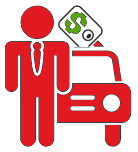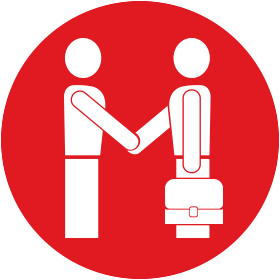Safety and efficiency is the key to a great car buying experience. While buying a car or track can be filled with excitement and nervousness, car buying process is not immune to fraud. Here at CarGalaxies.com, we believe that fraud is preventable if you know how to detect it and act accordingly.
Regardless if you are buying a car from a dealer, business or from a third party seller, a salesperson will never shy away from taking advantage of you and your wallet if they see you, the buyer is uneducated about the car buying process. Here are some general safety and fraud prevention tips which will help you to avoid common mistakes when buying your car.

Fraud Prevention Tips for Individual Sellers
Individual car sellers are more vulnerable than other partiers. Two most important things to pay attention to are the test drive and payment-related fraud.
Test Drive Fraud
-
Choose Test Drive Route.
Plan out your test drive route. It is not uncommon to have what is expected to be a peaceful test drive around the block end up in a tragedy. For your safety, carefully plan your test drive route:
- Choose to drive in places that don’t have a lot of traffic.
- Avoid secluded areas.
-
Have someone with you.
It is highly recommended that you bring someone with you to the test drive. Not only is the chance of that person being better educated about the car buying pitfalls, but it also makes your test drive a lot safer. Extra pair of eyes - from one side, and potential independent witness in the case of dispute - from another side, is what you get by bringing someone with you for the test drive.
-
Take Buyers Personal ID and/or Keys.
If you are going on a test drive with just the buyer, make sure that you take some form of personal identification from that buyer to prevent incidents such as car theft. As a rule of thumb avoid by all means test drives by buyer without you in car. If for some reason this cannot be avoided and buyer takes a test drive alone – take some collateral from him: for example, take keys from buyer’s apartment/house for the duration of test drive.
Payment-Related Fraud
-
Avoid Payment Plan Scam.
Avoid buyers who are interested in a “payment plan.” This is a red flag for a scam. Even though the terms may attract you to say Yes avoid the payment plan requests at all cost – you may never get your money back.
-
Use Escrow Service.
An escrow service regarding buying a vehicle is when a third party company helps you to hold a title to your car until you are 100% sure you are guaranteed payment. If you are using an escrow service, make sure the bank or attorney is reputable and trustworthy.

Fraud Prevention Tips for Buyers
Common Scams When Buying Car from Individual Seller
-
Request a Test Drive.
Never buy a car without a test drive even if you buy a new car! Plan test drive very carefully and diligently. Remember an old adage: “Failing to plan is planning to fail”.
If you are individual buyer – make sure to read our fraud prevention tips for individual sellers above.
-
Decide on your payment.
Before buying your next vehicle (new or used), make sure you know how you will be paying for it. Many dealerships will attempt to sign you for auto loan from them. Don’t do it until you are absolutely desperate – car loans from dealers are very often (although not always) come with higher interest rate than independent loans from 3rd party money lenders.
-
Check the Vehicle history.
When you are searching for a used car, it is extremely important that you check the vehicle history. You can use sites such as Carfax, instaVIN, AutoCheck or VinChex to validate that the price that is offered for the vehicle resonates with the condition it is in and/or if the vehicle has been in any accidents that can affect the mechanics of the car.
-
Check for the Car Title.
One of the most common scams from the individual sellers is to sell you a car they don’t actually own. To prevent this, ensure that the person who is selling the vehicle actually owns it. Also, if the person claims to be a selling the vehicle on behalf of the seller, red flags should be waving that this is most likely a scam.
-
Beware of Odometer Fraud.
An odometer can easily be manipulated to show any number and that’s just what some sellers frequently do to scam you into thinking you’re buying a “newer” car. To avoid this type of scam compare the mileage on the car to the mileage indicated on the vehicles maintenance report and for extra verification use the odometer check from trustworthy businesses like Carfax, AutoCheck and others.
-
Use Verified Mechanic.
A common scam is to sell you a car with hidden mechanical problems. Don’t over rely on solely test drive – many mechanical problems are deep inside and cannot be reliably discovered during short test drive. For that reason, it is highly recommended that you go to an independent, trustworthy mechanic to thoroughly inspect your future car.
Common Scams When Buying Car from Auto Dealers
-
Lies.
Many dealerships will tell you little white lies such as “That color isn’t available at this time” or “The price is available for today only” to pressure you to buy a car. Remember that buying a car takes time and consideration so be patient. Don’t be pressured into buying a car, especially from a salesperson. Just remember to treat them as you would for any person and be on your way if you’re not interested at what the dealership has to offer.
-
Trade-In
Salespeople are trained into pushing you into buying something you may not necessarily want or in the price that will shrink your wallet. This is particularly seen when a customer wants to trade in a vehicle at a pre-determined price. What a salesperson might do is accept your trade-in value but instead will raise the price of the car you want. To avoid this, negotiate each portion of your car payment separately.
-
“Sorry it’s sold out”
One of the most common scams is you receive an advertisement that states the price of a car you wanted. Once you arrive at the dealership and talk to a salesperson, they say that they are “sold out” of that particular vehicle and try to convince you to buy a car with a much higher price tag. To avoid this happening to you call the dealership beforehand to verify that what they advertise is still in stock or is the correct price. If they dealership clarifies their advertised price make sure they fax you a signed statement that indicates that the particular vehicle is in stock and states the set price.
-
Documentation
If you are purchasing a used car particularly from a dealership, make sure you have documentation that states all the agreements and terms. Some dealerships promise free incentives such as free service but won’t initiate the claim because it was not documented.
-
Spot Delivery Scam
Spot Delivery Scam or Yo-Yo financing occurs with buyers who are looking to purchase a car with bad credit. What happens is that the dealer makes the buyer believe that their car is financed but a couple of days or weeks later, the buyer gets a phone call informing them that the financing didn’t go through and they need to find a different lender that offers a much higher interest rate. To avoid this type of scams have a car loan approved beforehand so you know which rate you are approved for. If the dealer asks you to sign a “borrowed car agreement” it’s a red flag signaling that your financing is not through.
-
Monthly Payments
What many sales people try to do is make you focus on the monthly payments rather than the whole picture. To avoid paying more than you have to always negotiate the full price of the vehicle as well as any separate purchases including trade-ins and other products / services.
-
Low Trade-in Value
Some salespeople will try to scam you when you are trading in your vehicle by offering you a price lower than the average trade-in value. To avoid this scam research what other dealerships are offering for your vehicle so you can get the most out of your car.
-
Change in offer
You call your dealership because you’re interested in trading in your vehicle and the dealership gives you an offer and tells you to bring in your vehicle. No scam here right? Wrong. A potential scam can occur in this situation. Once you bring your car in for an inspection the dealership offers you a lower price than expected. To avoid this go to multiple dealerships to hear their offers and have them inspect your car in person.
-
Leasing Mistake
Many people don’t understand the concept of leasing and salespeople are very aware of this. It is for this reason they will take advantage of you and what dealerships may do is that they may change numbers around in your contract. Before you lease your car research more about how leasing works to avoid a scam such as this one.
-
Unnecessary Extended Warranties
If you need an extended warranty for the car your are buying never buy it from car dealers – their plans are usually considerably overpriced. You can save tons of money by purchasing an extended warranty online. CarGalaxies.com can help you choose an extended warranty provider and a policy that is right for you and your wallet.
-
Review your contract
Read over your contract thoroughly so you can avoid any hidden costs or any errors. If you don’t understand some paragraphs in contract – ask dealer to explain. Especially carefully read all fine prints – never forget that evil often hides itself in details.
-
Money Factor
To confuse buyers who are interested in leasing, many dealerships will show an interest rate as a fraction. To convert the interest rate all you have to do is multiply the fraction by 2,400. Then make sure the number you calculated is in your contract.
-
Paying Twice
When you lease a vehicle, it usually requires that you pay the first month payment upfront. However, sometimes the down-payment is included and some dealers will take advantage of you and you will end up double paying for your first month. To avoid this check your agreement to make sure you don’t double pay.

Where to Report Fraud
If you have any reason to believe you were a victim of fraud, the CarGalaxies.com team strongly urges you to report your crime to not only the Internet Crime Complaint Center, or IC3. IC3 who’s’ focus is solely on cybercrimes and is a partnership between the Federal Bureau of Investigation, the National White Collar Crime Center and the Bureau of Justice assistance. In addition, if you have any suspicions that you were scammed, contact your local law enforcement. They will make a report and work with you and your local fraud department.




